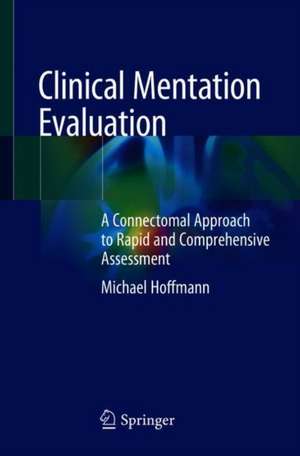Clinical Mentation Evaluation: A Connectomal Approach to Rapid and Comprehensive Assessment
Autor Michael Hoffmannen Limba Engleză Paperback – iun 2020
Developed by synthesizing outcomes data from a range of stroke registries, this novel work offers a stepwise, hierarchical approach to mentation evaluation largely determined by level of consciousness and degree of cooperation. Organized across 14 chapters, the book begins with an introduction to the challenges of cognitive and behavioral assessment, as well as a discussion of various clinical presentations ranging from mild behavioral impairment to cognitive reserve and its implications. Subsequent chapters then address various approaches to mental status evaluation and explore how these tests affect brain physiology. The work closes with a unique discussion of the various lay populations that may benefit from cognitive and behavioral evaluation.
Authored by a renowned expert in the field, Clinical Mentation Evaluation: A Connectomal Approach to Rapid and Comprehensive Assessment is an invaluable reference that seeks to revitalize neurological and psychiatric disease measurement within the clinical setting. The work will be of interest to all clinicians in training and clinical practice who regularly, or even periodically, conduct mental status examination.
Preț: 448.38 lei
Nou
Puncte Express: 673
Preț estimativ în valută:
85.82€ • 93.26$ • 72.14£
85.82€ • 93.26$ • 72.14£
Carte disponibilă
Livrare economică 01-15 aprilie
Preluare comenzi: 021 569.72.76
Specificații
ISBN-13: 9783030463236
ISBN-10: 3030463230
Pagini: 180
Ilustrații: XVII, 180 p. 62 illus., 53 illus. in color.
Dimensiuni: 155 x 235 mm
Greutate: 0.27 kg
Ediția:1st ed. 2020
Editura: Springer International Publishing
Colecția Springer
Locul publicării:Cham, Switzerland
ISBN-10: 3030463230
Pagini: 180
Ilustrații: XVII, 180 p. 62 illus., 53 illus. in color.
Dimensiuni: 155 x 235 mm
Greutate: 0.27 kg
Ediția:1st ed. 2020
Editura: Springer International Publishing
Colecția Springer
Locul publicării:Cham, Switzerland
Cuprins
1. Introduction: Overview and challenges of cognitive and behavioral assessment.- 2.Neuroanatomical and neurophysiological underpinnings of cognition and behavior: Cerebral networks and intrinsic brain networks.- 3. Clinical presentations: mild behavioral impairment, mild cognitive impairment, dementia, and cognitive reserve and its implications.- 4. Cognitive Reserve.-5. Bedside mental status evaluation: Overview, Coconuts, Cobe 50.- 6. Neuropsychological Testing and computerized cognitive testing.-7. Prefrontal network for executive control of cognition and comportment including the executive control, salience (ventral attention) and semantic appraisal (SAN) networks.- 8. Default Mode Network (mentalizing) and limbic network for explicit episodic memory syndromes.-9. Right dominant frontoparietal network for spatial orientation (Dorsal attention (visuospatial attention).- 10. Left dominant peri-sylvian network for language syndromes (and Language ICN network).- 11. Occipitotemporal network for face and object recognition syndromes (Visual network) occipitoparietal and provincial hub syndromes.- 12. Provincial hub syndromes, temporal, parietal, acquired cultural circuits.-13. Neuroplasticity and other treatment options for cognitive and behavioral neurological syndromes.- 14. Who needs evaluation? The case for you, leadership, executives and people in public office.
Notă biografică
Michael Hoffmann, MD, PhD
Department of Neurology
University of Central Florida
Orlando VA Medical Center
Orlando, FL 32801
USA
Department of Neurology
University of Central Florida
Orlando VA Medical Center
Orlando, FL 32801
USA
Textul de pe ultima copertă
This first-of-its-kind book offers clinicians a unique and comprehensive system of cognitive and behavioral testing that is tiered and context-appropriate for the diagnosis of mental status. Because the challenge nowadays with neurologic syndrome presentations is no longer merely lesion localization, but the degree, extent and nature of a cognitive and/or behavioral impairment, this work proposes a more targeted system of mentation evaluation -- one that incorporates behavioral, neurological, neuropsychiatric, and neuropsychological components.
Developed by synthesizing outcomes data from a range of stroke registries, this novel work offers a stepwise, hierarchical approach to mentation evaluation largely determined by level of consciousness and degree of cooperation. Organized across 14 chapters, the book begins with an introduction to the challenges of cognitive and behavioral assessment, as well as a discussion of various clinical presentations ranging from mild behavioral impairment to cognitive reserve and its implications. Subsequent chapters then address various approaches to mental status evaluation and explore how these tests affect brain physiology. The work closes with a unique discussion of the various lay populations that may benefit from cognitive and behavioral evaluation.
Authored by a renowned expert in the field, Clinical Mentation Evaluation: A Connectomal Approach to Rapid and Comprehensive Assessment is an invaluable reference that seeks to revitalize neurological and psychiatric disease measurement within the clinical setting. The work will be of interest to all clinicians in training and clinical practice who regularly, or even periodically, conduct mental status examination.
Authored by a renowned expert in the field, Clinical Mentation Evaluation: A Connectomal Approach to Rapid and Comprehensive Assessment is an invaluable reference that seeks to revitalize neurological and psychiatric disease measurement within the clinical setting. The work will be of interest to all clinicians in training and clinical practice who regularly, or even periodically, conduct mental status examination.
Caracteristici
Features a tiered approach with rapid, intermediate and longer assessments depending on the clinical urgency and context. Incorporates neurological, neuropsychological, neuropsychiatric and language assessments. Based on the newly appreciated network organization of the brain which subserve these cognitive processes.
